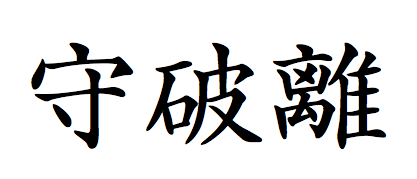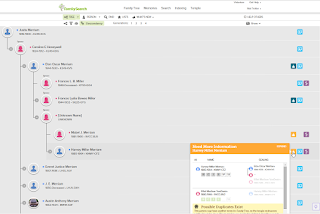A
matriarchal family can be described as being full of strong women usually headed by a grandmother. My wife's family is definitely matriarchal. When her grandmother was alive everything ran through her. I am not saying that her grandfather did not play an important role but grandma Furniss was a feisty lady who knew how to get others to tow the line. The fact that she only had daughters, who are all equally feisty, makes this a multi-generational matriarchal family.
A
matriarchy is a social system in which the mother is the head of the family and the society is governed by women.
"Anthropologists and feminists have since created more specific classifications for female societies, including the matrilineal system. Matrilineality refers not only to tracing one’s lineage through maternal ancestry, it can also refer to a civil system in which one inherits property through the female line. While the legendary Amazons (probably the most widely known matriarchy) are relegated to mythology, there are a handful of female-led societies that thrive in the real world today."
Many of the traditions, customs, beliefs and values we gain from our mothers. The
culture of our family is made up of their contributions and can be a trademark of our families as much as our surnames. The foods we eat, clothing we wear, traditions we hold are all part of our culture. Our
heritage can also passed to us by our mothers. In legal terms heritage refers to objects that are passed down or inherited. In Family History terms our heritage is more than objects, it is traditional, a mix of cultures and customs.
Heredity has to do with the genetic passing of traits from parents to children. Eye and hair color are examples of these traits.

The lines between culture, heritage, and heredity are sometimes blurred. We deal will all aspects in family history but should be mindful of the differences. According to traditional Jewish law, a person is Jewish if they were born to a
Jewish mother. Although being Jewish is not in someone's DNA the tradition holds that the soul is more directly shaped by the mother than the father.
105 Questions to ask your mother:
1. Are you living your dream or are you chasing it?
2. Can I have the recipe?
3. Can you remember one memorable thing that each of your children said, something that surprised you, amused you or impressed you that still sticks out in your mind?
4. Did you ever win or earn an award?
5. Did you have big fights with your mom when you were growing up? If so, what were they usually about?
6. Did your parents or grandparents ever lose their jobs? What happened? How did they start over?
7. Do you believe in God?
8. Do you believe snitching is a good or a bad thing? Have you ever snitched on a friend?
9. Do you consider cooking and cleaning a woman’s work?
10. Do you have a favorite band or song?
11. Do you have any regrets for something you wish you would have done?
12. Do you like ice cream? What is your favorite flavor?
13. Do you think crying is a sign of weakness?
14. Do you think it’s easier or harder to be a mother now than when you were raising our family?
15. Has anything ever happened at a family wedding that you’ll never forget?
16. Have you ever been fired before?
17. Have you ever quit anything before?
18. How are you most different from your parents and grandparents? How are you the same?
19. How did you and dad meet? Why did you marry him?
20. How did your parents change after they retired?
21. How do you deal with criticism?
22. How do you discover new ways to do something i.e. did you brainstorm and put in on paper, did you daydream etc.?
23. How has being consistent changed your life?
24. How important is personal appearance?
25. How much education is enough?
26. How much money is enough?
27. How would people who knew you in high school describe you?
28. How would you define a mother’s role at home?
29. How would you like to be remembered?
30. If you could go back to one day in your childhood, which day would that be? Why?
31. If you could know anything about our family history or about a relative who has passed away, what would you want to know?
32. If you were to win the lottery how would you spend the money?
33. In what ways do you think I’m like you? And not like you?
34. Is there anything that you wish had been different between us? or that you would still like to change?
35. Is there anything that you wish you had asked your parents but didn't?
36. Is there anything you have always wanted to tell me but never have?
37. Is there anything you regret not having asked your parents?
38. Is there something that you wish you had experienced that you haven't yet experienced?
39. One thing you wanted to hear your father/mother say to you?
40. Tell me a story about a family reunion or family party that you remember attending as a child.
41. Tell me something unique about each of your children?
42. Think of some relatives that have passed away in the last few years. What would they be doing right now if they were with you?
43. Were you a giver or a taker?
44. Were you ever in the newspaper or on television?
45. What are key ingredients for strengthening a family?
46. What are some of your earliest memories?
47. What are the three happiest moments in your life so far?
48. What are the three things in life to never do?
49. What are the top three things that you stand for?
50. What are you most grateful for?
51. What are your best memories of holidays or family gatherings as a child?
52. What are your favorite childhood memories?
53. What are your favorite stories that grandpa/grandma told (or still tells)?
54. What did you have as a child that kids today don’t have?
55. What did you want to be when you grew up?
56. What did your grandparents do with you that you loved? What did they do that you didn’t enjoy so much?
57. What do you remember about the houses you lived in as a kid? Which one did you like the best?
58. What do you remember most about your dad?
59. What do you remember most about your mom?
60. What habits do you have that are not aligned with your core values?
61. What has been your greatest accomplishment?
62. What has been your greatest struggle?
63. What has been your strategy in challenging your children to do more?
64. What has brought you the most joy?
65. What has surprised you the most in your years?
66. What is better about the world today than when you were growing up?
67. What is the best thing that your grandparents ever cooked? What about your parents?
68. What is the most embarrassing thing your mother or father ever did to you?
69. What is the most rebellious thing you ever did in high school?
70. What is your favorite National Park?
71. What is your favorite hobby?
72. What is your favorite joke? Why?
73. What is your favorite movie or book now?
74. What is your favorite thing to eat?
75. What mistakes taught you the most about life?
76. What talents do you have?
77. What three adjectives would your grandparents use to describe you?
78. What traditions your mother pass on to you and you passed to your children?
79. What was the hardest thing you went through as a child? How did you overcome it?
80. What was your favorite movie or book when you were a kid?
81. What was your favorite movie or book when you were my age?
82. What was your favorite pet when you were a kid?
83. What was your favorite subject in school?
84. What was your first job and how did it go?
85. What was your greatest trial?
86. What was your relationship with your father like?
87. What was your vision and purpose for your children?
88. What world events have had the most impact on you?
89. What's the greatest game you ever saw?
90. What’s one thing you wish you did differently before you got married or had kids?
91. What’s the best decision you’ve ever made?
92. What’s the best gift you’ve ever received?
93. What’s the best thing I can do for you right now?
94. What’s the one thing you would have done differently as a mom?
95. What’s your philosophy on motherhood?
96. What’s your secret to building true friendships?
97. What’s your strategy for taking major risks?
98. When you were a teenager, which family member did you go to for advice? Looking back, was it good advice?
99. Which do you have more of courage or integrity?
100. Which family member has been your greatest coach in life? How have they coached you? What has made them good at it?
101. Which mistakes taught the greatest life lessons?
102. Which was more important to you being a mother or being a wife?
103. Who were your best friends and why?
104. Why did your parents give you your name?
105. Why do you live here now?









































